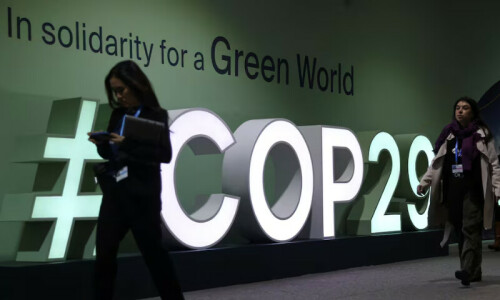ELSINORE (Denmark), Aug 30: Danish Foreign Minister Per Stig Moeller said on Thursday he plans to travel to the Middle East next week to present a new EU peace plan, notably proposing a provisional Palestinian state by 2003.
The three-stage peace plan, due to be discussed by EU foreign ministers gathering on Saturday in the Danish port town of Elsinore, sets out a timetable aiming at the establishment of a full Palestinian state by 2005.
“I hope my EU colleagues will rally around this road map that the Danish presidency has proposed and which will be one of the themes of discussion at this meeting,” he told reporters.
According to a copy of the plan, the first stage of the EU plan would involve negotiations this autumn, leading before the Palestinian elections next January to a security agreement allowing the withdrawal of Israeli forces from re-occupied Palestinian areas.
The second stage of the process “starts after Palestinian election in January 2003 and ends with the conclusion of an agreement on the creation of a Palestinian state with provisional borders by August 2003.”
The third phase of the plan, after August 2003, would involve a final phase of negotiations aimed at the formal creation of a full Palestinian state “with limited arms” by 2005, according to the Danish presidency document.
At the same time peace talks would be launched between Israel, Lebanon and Syria, the plan suggests. To facilitate the accord, the Danish plan calls for “a public statement in Arabic by the Palestinian leadership, restating Israel’s right to exist and calling for the respect of the Jewish faith.”
At the same time, “It is clear that Israel must lift the blockade on the Palestinian territories in order to ensure Palestinian elections in January, and gradually pull out as the Palestinians take charge of security in these zones,” Moeller said.
“The Israelis must allow the Palestinian legislative assembly, which is to be elected next January, to meet and vote on laws, and release the 600 million dollars due the Palestinian Authority, all the while ensuring that it will not be used to finance terrorist activities,” he added.
Moeller said he “hoped and expected” that the EU would support the peace plan.
In such a case, he would meet Saudi Foreign Minister Prince Saud al-Faisal on Monday, Egyptian Foreign Minister Ahmed Maher on Tuesday, and Israeli Prime Minister Ariel Sharon and Palestinian leader Yasser Arafat on Wednesday.
The document said Israeli-Palestinian negotiations leading to such an agreement would take place under the auspices of the so-called Quartet, comprising the European Union, Russia, the United Nations and the United States, alongside three moderate Arab countries: Egypt, Jordan and Saudi Arabia.
The United States expects the quartet on the Middle East to meet at a senior level in New York on September 16, four days after Secretary of State Colin Powell is to give a major speech on US policy in the region, officials had said Tuesday.
Representatives from the quartet are to gather on the sidelines of the annual UN General Assembly to continue discussions on Israeli-Palestinian peace efforts, the officials said.
The meeting, which will group Powell, UN chief Kofi Annan, Danish Foreign Minister Per Stig Moeller and Russian Foreign Minister Igor Ivanov, is set to be held after Powell is to deliver a speech outlining a US program to promote democratic reforms in ME, they said.—AFP













































Dear visitor, the comments section is undergoing an overhaul and will return soon.